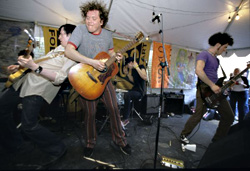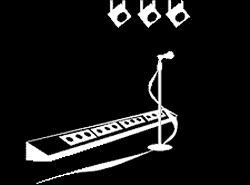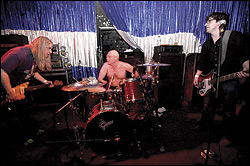“I think it’s 270. Or 270 North. It goes northwest.” Bobby Bare Jr. and band—the Young Criminals Starvation League—are trying to “break out of the Beltway” after the previous night’s show at Arlington, Va.’s Iota Club. It’s the release date of Bare’s fifth album, The Longest Meow, which was recorded in a rapid 11 hours with the League and help from pals . . . And You Will Know Us by the Trail of Dead and My Morning Jacket.
Allowing that 16 days of preproduction were involved, Bare says he’s “always wanted to do the whole band in one room and make it sound that way—always wanted to do that kind of Wall of Sound thing, almost. Even though with what we do it’s not gonna be like the Motown stuff. Still, we really didn’t even use headphones. It was just us playin’.”
As much a mood piece as anything the often rambunctious Bare has done, Meow covers a wide swath of ground: “Sticky Chemical” is a calypso that ponders the neurology behind romantic attachment; the ambling “Back to Blue” might become a country hit if not for lyrical images of condom wrappers and cocaine. “Where Is My Mind” brings the Pixies song into hardly less agitated solo-acoustic territory, while “Uh Wuh Oh” could be Bare’s repayment scheme for Surfer Rosa‘s influence.
While Bare is hardly the only latter-day Nashvillian who knows who Frank Black is—he sang on Black’s recent Fast Man Raider Man, along with Buddy Miller and Lucinda Williams—he’s one of the relative few with a dad who tabled a legendary country-music career in order to spend much of the past 20 years fishing. But Bare Jr. and Lambchop’s Mark Nevers pulled the old man out of retirement for last year’s The Moon Was Blue and four live dates. (One at the Tractor Tavern, preceded by an uproarious KEXP interview.) Sessions for a Moon sequel are tentatively planned for December. But it wasn’t the first father/son collaboration for the two. They shared a major ’70s country hit with “Daddy What If” when Bare Jr. was just 5 years old. Considering he tasted success at such a young age, it’s a wonder he never considered a move to the mainstream.
“No. No,” he says emphatically, rousing himself from what’s sounded like a just-woke-up delivery. “I was the guy in the Devo T-shirt at all the Country Music Hall of Fame, CMA Awards, or whatever. I just never ever saw myself doing that.”
While digging ever deeper into rock territory, Bare continued to lean on the inspiration of his father and Shel Silverstein, author of “Daddy What If,” “A Boy Named Sue,” “Cover of the Rolling Stone” and a stack of much- beloved children’s books. Silverstein was a sounding board for all of Bare’s early songs (“for the first album or two when he was alive. Then I was on my owwwn“) and remains an influence on “everything I do.” Knowing Silverstein was such an influence, one wonders if he fed young Bare’s irreverence toward Nashville and music life heard on “Meet Me in Music City” and “Why Do I Need a Job.”
“No, most of it is from bein’ in Nashville and seein’ these cheesy, cheesy guys walk into a restaurant or a bar and someone leans over and says to me, ‘They’re an artist. They’re an artist on Capitol.’
“And it’s just really bad music they’re making in Nashville now, a lot of it. But also, I mean, Nashville’s making [some] of the best music they’ve ever made,” he says, alluding to the likes of Lambchop. He seems pleased to announce, for instance, that “the Silver Jews live 200 yards out my back door.”
After two failed major- label deals (and a reported five-fold increase in sales between his second album, for Immortal/Virgin, and his third, for Chicago imprint Bloodshot), how does it feel to hear The Longest Meow touted as a potential breakthrough record?
“Ah—nobody knows. I’ve had the most successful music business people sittin’ right in front of me telling me and believing with all their soul, ‘This is gonna be huge, this is really gonna be huge.’ And they don’t know.
“[And] probably 95 percent of the artists they’ve ever worked with . . . it didn’t happen at all. And the reason why the ones that do happen—for everybody that Clive Davis had [who] has been a huge success, he’s had 20 artists that just failed. And they truly believe in all of ’em. And nobody really knows. And that’s also what has always kept me hangin’ on, because nobody really knows why something’s gonna just pop through. All you can do is just kinda hold your ground, do your thing, and maybe the eyes of the public will happen to gaze your way.”








